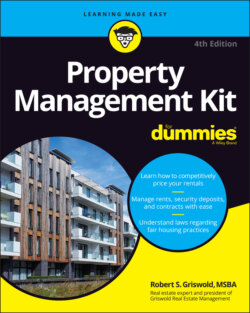Читать книгу Property Management Kit For Dummies - Robert S. Griswold - Страница 66
Knowing What to Get Up Front
ОглавлениеIf you’re thinking about buying a residential rental property, you need to start by thoroughly investigating all aspects of it and its current tenants, if any. After all, no one is going to represent your interests as well as you.
The formal due-diligence period (between the acceptance of an offer and the close of escrow or completion of the sale, is the time to ask tough questions and make sure that you verify everything you have been told and are counting on getting in writing. (Escrow is an account for funds and documents held by a neutral third party in a real estate transfer until all the conditions have been met, per the written instructions of the seller and buyer.) Don’t be shy. To be sure that you know what you’re getting, talk to the tenants; the neighbors; any homeowners’ association; local government agencies, including law enforcement and any rent-control board or similar organization; and the property’s contractors or suppliers. Search the web for public information such as code violations, police reports, and registered-sex-offender tenants. When you’re in this situation, remember my favorite motto: no surprises.
Don’t underestimate the importance of this step. This review of the books and records, along with the physical inspection, reveals the actual operations of the property and allows you to determine whether the property is suitable, fairly priced, and meets your financial goals. When the property sale is complete, it’s too late to ask the seller to fix the leaky roof unless they engaged in an intentional effort to cover up the true condition of the property. Your remedies may come only in court, which can be costly and reserved only for the most serious or expensive issues.
Most sellers are honest and don’t intentionally withhold information or fail to disclose important facts. But the adage “Buyer beware” rings particularly true in the purchase of residential rental real estate. Resolving questions and issues now through regular communication with your seller eliminates some very unpleasant and possibly contentious disagreements with your tenants in the future.
The due-diligence period may be your best or only opportunity to seek adjustments if the seller misrepresents any important issues. What if you weren’t aware that this property is subject to onerous rent-control limitations? When you sign your name on the dotted line, the deal’s done. You can’t go back and ask the seller where the tenant’s security deposit is. So even though taking over your new property can be chaotic, don’t fall into the trap of verifying the facts verbally. Confirm all information in writing, and begin setting up a detailed filing system for your new property.
“As is” sales are common in many areas of the country. Many sellers simply prefer to put as much of the onus as possible on the buyer to perform a very comprehensive and diligent pre-purchase due-diligence investigation of the property. But that preference doesn’t change the legal disclosure requirements of sellers to fully disclose any and all known material issues with the property, particularly those related to its current physical condition, and/or a complete history of maintenance and repair issues.
In the following sections, I cover some items that you must have in writing before the deal is final. At www.wiley.com/go/propertymanagementkitfd4e, you will find a Property Takeover Checklist for small and large properties.
